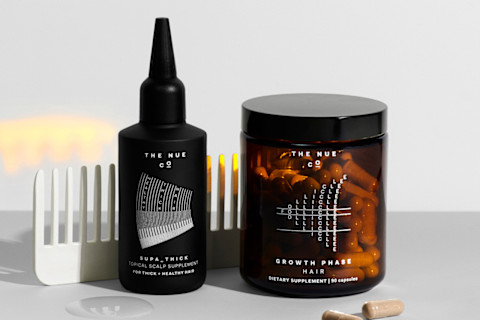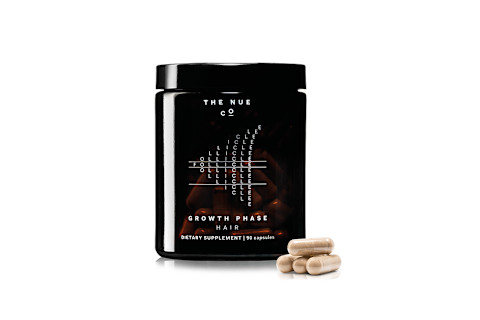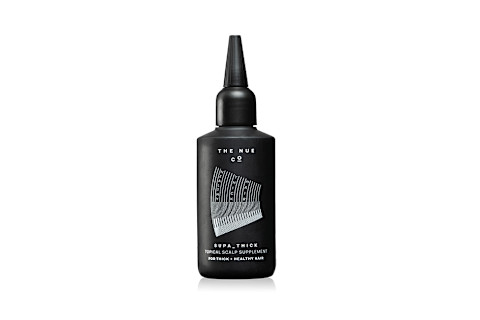Can I Stop Hair Loss? And 5 Other Hair Questions You Need Answered

We all love a good hair day. When your mane is looking luscious, it feels like nothing can stand in your way. But for some of us, it seems like the days of healthy, thick hair are becoming a thing of the past. The hair collecting in your brush and the frequently clogged shower drain may leave you frustrated and confused.
But before the panic sets in, there may be a reason your hair is changing—and that means there are actions you can take to regain control, including using supplemental aids like The Nue Co.'s GROWTH COLLECTION.* Whether it's their GROWTH PHASE supplement for inside-out hair support or their SUPA_THICK topical aid to directly target the scalp, a new hair care regimen may be just what you need.*
To help our readers better understand the triggers behind everyday hair loss, we talked to board-certified dermatologist Keira Barr, M.D., to answer some important hair-related questions.
Shop The Growth Collection:
mbg: We know that nutrition is important for healthy skin, but how does nutrition affect your hair?
Dr. Barr: There are many essential nutrients that directly impact hair structure, texture, and viability. Nutrients including iron; zinc; selenium; niacin; vitamins A, D, E; folic acid; amino acids; protein; and fatty acids can affect hair growth and color.* Therefore, inadequacies or deficits in these nutrients can spell hair troubles.
For instance, we know that oxidative stress has been linked to hair loss, and antioxidants are compounds that are able to neutralize reactive oxygen species (ROS), thereby helping us regain antioxidant vs. oxidant balance. Zinc, selenium, and vitamins A, C, E, and polyphenols are dietary antioxidants that play a key role in reinforcing our endogenous antioxidant system.*
mbg: Does stress really make your hair fall out?
Dr. Barr: Yes, stress can contribute to hair thinning or falling out. With approximately 100,000 hair follicles on the adult scalp, each follicle is constantly cycling between anagen (growth), catagen (rest), and telogen (shedding) phases. While the majority of hair follicles are in the growth phase (anagen) at any given time, there are circumstances that can create an accelerated shift to the shedding phase, like stress.
What's important to know is that the physical evidence of the shift isn't immediate. Someone may not see loss of hair until three to six months after a stressful event. For those individuals dealing with prolonged stress, however, this hair loss conundrum may last longer. The good news is that this thinning of hair is temporary if the underlying source of stress is addressed. A second manifestation of the impact of stress on hair is the impact that elevated stress hormones have on the production of other hormones required for healthy hair growth.
mbg: Any tips for new moms dealing with postpartum hair struggles?
Dr. Barr: First and foremost, don't panic. Some hair changes are expected postpartum. Estrogen plays a significant role in hair growth. As noted above, your hair grows in three phases, with anagen being the growth phase. Estrogen levels are elevated during pregnancy, which is why many women notice their locks are more luscious during this time. Following delivery of your baby, your estrogen levels naturally plummet and your hair cycles shift as a result.
While loss of 100 hairs is typical for most individuals, due to the robust estrogen levels and more hair follicles in anagen (the growth phase) during pregnancy, it is totally normal that with the sudden shift in estrogen levels, that hair follicles shift from anagen (growth) to telogen (resting/falling out) phase.
mbg: What does pollution do to your hair?
Dr. Barr: Air pollution can impact your hair in a host of ways, including contributing to hair loss, accelerating hair aging, affecting hair color, and causing buildup. A 2019 study highlighted that exposure to common air pollutants created from burning fossil fuels can impact the proteins in our cells that are responsible for hair growth and hair retention, and significantly reduce them. One of the biggest ways air pollution affects hair health is oxidative stress. Free radical stress to hair can manifest as hair graying, loss of color1, or even hair loss.
mbg: What can we do today to make our way toward healthier hair?
Dr. Barr: First and foremost, give yourself some grace, take a deep breath and acknowledge all that you are doing on a daily basis. We are living in unprecedented times of skyrocketing stress levels. With 77% (and rising) of adults reporting experiencing stress that impacts their health—and skin concerns being among the No. 1 reasons people go to the doctor—it-s no surprise that hair health is involved as well.
In addition to learning mind-body skills, rebalancing your nervous system requires a strong foundation for health that includes a supportive diet and lifestyle that suits your individual needs. Reducing your overall stress load by improving sleep, optimizing your type of exercise, shifting your mindset, and sometimes targeted supplementation can help optimize not only your overall well-being but your hair health too.*

Taking action.
There are clearly a myriad of factors that can contribute to hair loss, with nutrition, stress, hormones, and pollution at the top of the list. But making the necessary lifestyle adjustments and adding nourishing products can help you to get back on track. The Nue Co.'s GROWTH COLLECTION is a great place to start for a little extra support.*
Using adaptogenic ingredients and key vitamins and minerals, the ingestible supplement GROWTH PHASE helps to moderate the body's stress response,* while the topical aid SUPA_THICK works to gently cleanse and exfoliate the scalp, removing buildup and stimulating circulation to the hair follicles. So if you're experiencing unwanted changes in your hair, don't fret. With a whole-health approach including appropriate supplementation and a newfound awareness of the lifestyle changes that need to be made, you're already one step closer to healthier, thicker hair!*




